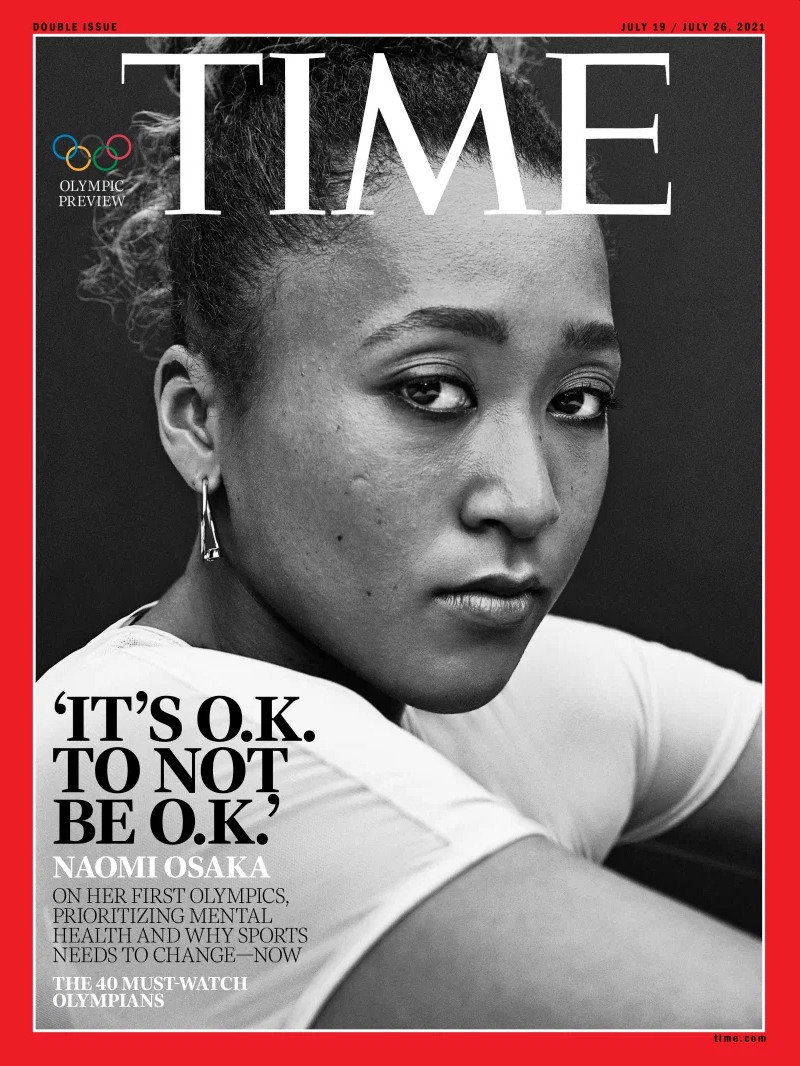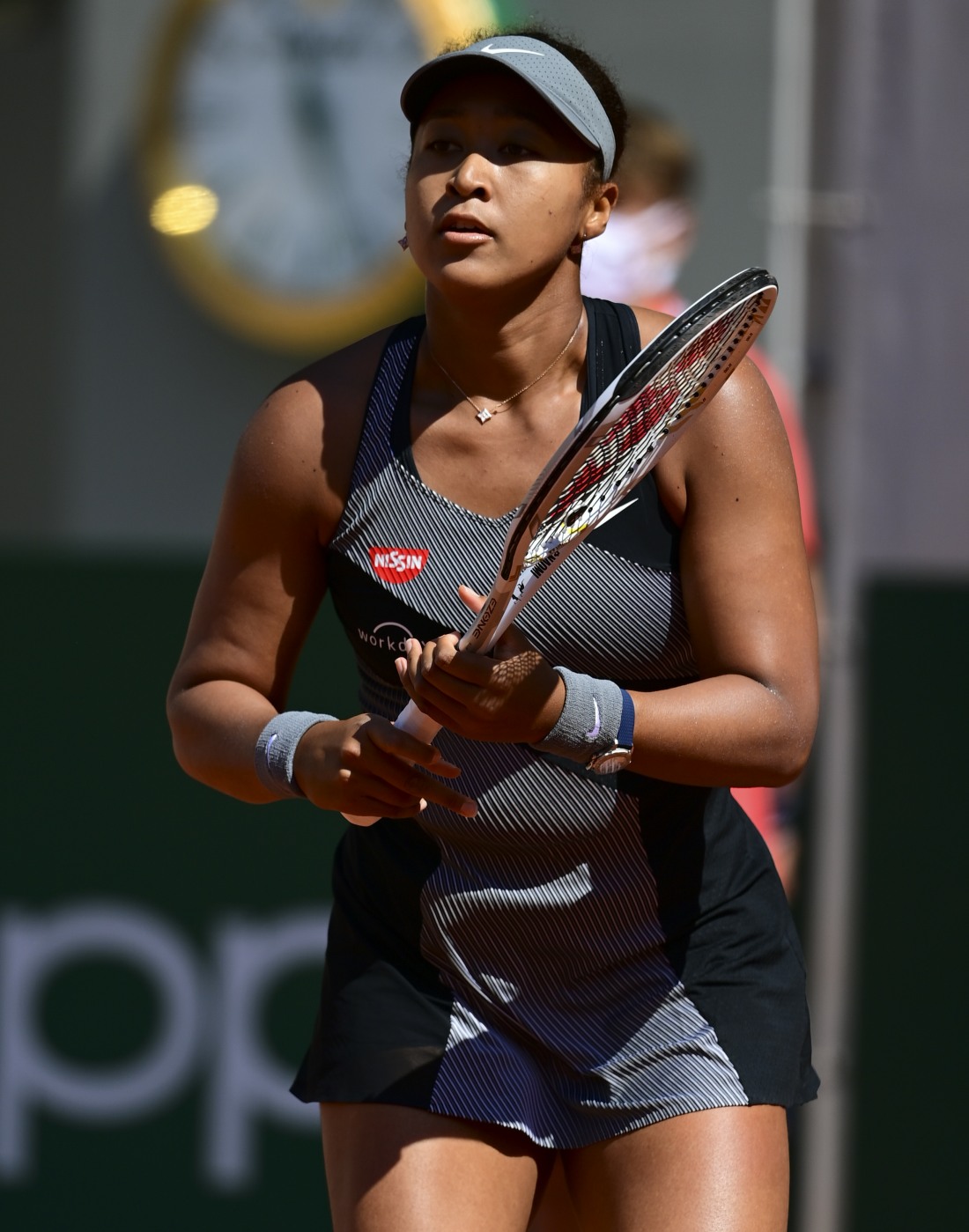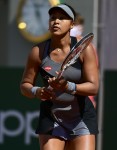Naomi Osaka covers the latest issue of Time Magazine and she’s written a personal essay about sports and mental health. In May, a few days before the start of the French Open, Osaka announced on her social media that she would not participate in the press conferences which are mandatory for players (especially top players) at tennis tournaments. In her first statement, she said that “people have no regard for athletes’ mental health and this rings true whenever I see a press conference or partake in one…We’re often sat there and asked questions that we’ve been asked multiple times before or asked questions that bring doubt into our minds and I am not going to subject myself to people who doubt me.” She said she would pay whatever fines the tournament gave her for missing the mandatory pressers but she hoped the money would go to a mental health charity.
To say that Osaka’s first statement set off a firestorm would be an understatement. Osaka played her first match at the French then didn’t do her first-round press conference. The French Open fined her, and the four majors released a joint statement basically saying “these are the rules, and if you or any player continues to disregard the rules, you could be disqualified from the tournament or suspended from the tour.” In response, Naomi’s sister Mari Osaka wrote a Reddit post which absolutely made it sound like the Osaka family was conflating mental health with “don’t ask me questions about why I’m bad on clay.” And after all of that, Naomi withdrew from the French Open, claimed she would never trivialize mental health, and she said she has a history of depression. A few weeks later she withdrew from Wimbledon as well. She plans to play the Tokyo Olympics, and this Time cover is sort of an Olympic preview. You can read Osaka’s full essay here. Some highlights:
The first lesson she’s learned: “You can never please everyone. The world is as divided now as I can remember in my short 23 years. Issues that are so obvious to me at face value, like wearing a mask in a pandemic or kneeling to show support for anti-racism, are ferociously contested. I mean, wow. So, when I said I needed to miss French Open press conferences to take care of myself mentally, I should have been prepared for what unfolded.
Second lesson: “It has become apparent to me that literally everyone either suffers from issues related to their mental health or knows someone who does. The number of messages I received from such a vast cross section of people confirms that. I think we can almost universally agree that each of us is a human being and subject to feelings and emotions. Perhaps my actions were confusing to some because there are two slightly different issues at play. In my mind they overlap, and that’s why I spoke about them together, but let’s separate them for the sake of discussion.
She hates press conferences: “This was never about the press, but rather the traditional format of the press conference. I’ll say it again for those at the back: I love the press; I do not love all press conferences. I have always enjoyed an amazing relationship with the media and have given numerous in-depth, one-on-one interviews. Other than those super-stars who have been around much longer than I (Novak, Roger, Rafa, Serena), I’d estimate that I’ve given more time to the press than many other players over recent years. I always try to answer genuinely and from the heart. I’ve never been media-trained, so what you see is what you get. The way I see it, the reliance and respect from athlete to press is reciprocal.
She wants sports media to be “Less subject vs. object; more peer to peer.” “Upon reflection, it appears to me that the majority of tennis writers do not agree. For most of them, the traditional press conference is sacred and not to be questioned. One of their main concerns was that I might set a dangerous precedent, but to my knowledge, no one in tennis has missed a press conference since. The intention was never to inspire revolt, but rather to look critically at our workplace and ask if we can do better.
A personal day: “I communicated that I wanted to skip press conferences at Roland Garros to exercise self-care and preservation of my mental health. I stand by that. Athletes are humans. Tennis is our privileged profession, and of course there are commitments off the court that coincide. But I can’t imagine another profession where a consistent attendance record (I have missed one press conference in my seven years on tour) would be so harshly scrutinized. Perhaps we should give athletes the right to take a mental break from media scrutiny on a rare occasion without being subject to strict sanctions. In any other line of work, you would be forgiven for taking a personal day here and there, so long as it’s not habitual. You wouldn’t have to divulge your most personal symptoms to your employer; there would likely be HR measures protecting at least some level of privacy.
Under pressure to disclose: “In my case, I felt under a great amount of pressure to disclose my symptoms—frankly because the press and the tournament did not believe me. I do not wish that on anyone and hope that we can enact measures to protect athletes, especially the fragile ones. I also do not want to have to engage in a scrutiny of my personal medical history ever again. So I ask the press for some level of privacy and empathy next time we meet.
I absolutely agree that no one should be pressured to disclose their medical or psychological issues to the media or their employers. That being said, the issue of feeling like she was under pressure to disclose is a bit more complicated than she admits. She was the one who made the initial public statement about her mental health, on her social media. When the French Open officials tried to speak to Osaka privately, they were (by their account) blocked from doing so. She chose to make all of this a public issue from the beginning, even when there were a lot of different options for her, many of them private. You can’t start a public conversation about your personal mental health and the role and function of the sports media and then expect people to not talk about it, or ask you any for any specifics, or any clarification, or literally any follow-up questions?
Naomi also thanks a number of people for getting in touch with her before and after she withdrew from the French, including Michael Phelps and the Duchess of Sussex. There was this really awful moment where Piers Morgan was attacking Naomi (because he wanted attention) and a lot of people were bringing up his treatment of Meghan.
Photos courtesy of Avalon Red, cover courtesy of Time.



















There is never a shortage of people who feel entitled to tell women what they should do, think, say. Could I be talking about Piers Morgan, Priests, School Dress Codes? yes yes yes.
Eh, who gets into any kind of sport with the idea that press conferences will be a required part of the career choice? Let her play and leave her alone is my feeling.
Anyone who wants to play professionally? There are thousands of players who would happily take her spot and all of the obligations that come with it. She can’t expect to get the money from playing but not do some of the things that generate those dollars.
I would think televising the games and charging admission is where the money is generated. How does talking to a reporter generate income?
I think the argument is that the press conferences make the people more aware of who the “personalities” are, thus raising the profile of the sport. When you raise the profile of the sport, you can then raise the price of admission and the cost of televising the sport. Since we all know who Roger Federer is, we’re more likely to tune in to Wimbledon. I’m not sure I believe the press conferences are responsible for this since I rarely watch them except when I’m bored and sifting through Youtube, but I can see how journalists as a group (maybe) generate some interest in the personalities by writing about them in random articles from time to time.
When I’m not sure who player X is in a final, I do find myself less likely to watch. I’ve gotten so used to some familiar names in the last 2 decades with no obvious replacements for the top people, it is hard to try and get used to seeing new names since they’re not really stepping up that well. I’m not sure if this is how other people respond to tennis, but I’ve found myself feeling this recently. This is probably where a few random articles and the associated marketing about not-so-famous player X probably helps out a bit.
If she’s the better player, she should play, and why shouldn’t she expect to–she’s not an entertainer. Why expect great athletes to be talkers/personalities who love the spotlight, when most just love their sport? Ohhhh, right. Capitalism.
Once you’ve become as famous as she is, I think you have the power to do what you want. If she doesn’t want to do a press conference, I don’t really see why she should have to since her wins now stand as her accomplishments.
But for the lower level players as they are rising, I can see how some of that press attention might help. Also, if you’re a one-off winner rather than a 20 time winner like Serena Williams, I can see how some of the press stuff helps a bit. So, in other words, I think the press hype helps the lower level players but I don’t think the higher level players who are constantly winning necessarily need the attention (anymore) to bring some “it” factor to the sport.
I do think someone like Anna Kournikova who never won anything benefited from press attention, for instance. I guess whether you “need” the press depends on what kind of player you are. The constant winners like Federer who are also well-liked probably don’t need the press (anymore), but someone like Anna Kournikova got a lot of money from being well-known but not winning anything. Not all players are wealthy just from winning.
Talking to a reporter generates income because every one of them goes on to write a story in the publication that they work for, which generates dollars for: (1) the tournament; (2) the publications; (3) the network broadcasting the tournament; and (4) the athlete’s brand sponsors, all of which translate into $$$ for the athlete. The press conference isn’t just a standalone thing.
the same people who say ‘shut up and play’ are now pissed that she doesn’t want to talk….
I was initially quite sympathetic and I find her a sympathetic figure in general overall, but I’m not sure how I feel about how the article itself as it was written. Maybe it would just be better to let her racquet do the talking.
//Maybe it would just be better to let her racquet do the talking.//
Sounds like she’d be very happy if this option was available to her.
Also, empathy would b much more useful than sympathy.
I don’t really know how either would really be of any help to her from me, to be honest. I don’t know any of the tennis players or the powers-that-be personally. I’m pretty useless to her. I have zero power to change the press conference format or anything else in tennis for her.
She brought up two point in her first statement. She needed to skip the press conference for her mental health and the role those format of press conferences play on the mental health of athletes. People purposefully ignored the first point and started criticize her for the second.
Exactly! And let’s face it, there are still reporters who ask asinine questions and it would probably get into her head and create doubt. That’s tremendously a terrible position to be in when you are playing your heart out and this little voice crops up in her head, maybe I am not good on clay courts, maybe they are right?
I seems to me that until all reporters express empathy and do not mess with an athletes head, it would be easier to give a press conference. I don’t think she should be punished for wanting to protect her mental health. As she said, in the 7 years she has been touring, she had never missed a press conference.
@ BothSidesNow : Naomi makes the statement that she’s never had media training, I believe that IMG (a mega agency that represents athletes) scopes out their clients while the athlete is still in his/her teens and trains them for their future career as a pro. Part of that training is media training to the point of having mock press conferences for the young athlete. I agree reporters ask stupid questions but maybe Naomi would feel better if she did some media training. She may never enjoy the process but it may help her feel less stress over them.
Is anyone safe from Piers’ Morgan’s attacks these days?
–
The reaction of the press and the tournament’s was terrible and they’ve yet to apologize for their role in this incident. It’s clear that tennis needs a mental health policy and to give more support to players.
Has anyone thought about why should ‘celebrity’ be a required part of being a commercially successful athlete? If a person simply wants to make money at only doing their sport, can they do that?
It sounds to me like Naomi is saying, I want to play tennis, I’m happy to do one-on-one interviews with the press, but no more press conferences. Why can’t she do that? And if the argument is that players doing press conferences are working harder then her, than pay them for doing press conferences.
Paying them to do press conferences may not be a bad idea.
I do think the amount of prize money the winners get in tennis might be tied to being a celebrity to some extent. I don’t think tennis players in the past received as much money as they do today. Some of that might owe to the fact that the level of fame brings in more revenue, which therefore means you can pay them more for playing. A person who is not a tennis fan is likely to know who Roger Federer is today because of his level of celebrity. I assume that would have some impact on the amount of prize money he gets for winning. Any time a heavy amount of money is involved, whether it be tennis, soccer, football or boxing, I believe some level of celebrity becomes part of the packaging, whether the individual likes it or not.
That said, I don’t think athletes should have to put up with it no matter what. It’s just that instances are rare where I’ve seen the two factors of celebrity and money separated from each other, especially if endorsements are involved. Even if you decide to step away from press conferences, Nike will somehow manage to make an introverted person a celebrity, even against the person’s intentions.
I’m not at all convinced that the French Open officials were willing to engage in good faith or give her a reasonable option to skip press conferences for her mental health. And people did publicly (& on this blog) question whether her mental health issues were legitimate, so I understand why she felt pressured to disclose more details about her struggles. She should never have had to do that.
I suspect she & Meghan had plenty to talk about, both having worked in institutions with outdated ideas about forcing people to engage with the press as part of their job. And they were both also expected not to speak about how that might affect them. And both attacked by Piers Morgan for refusing to be silent.
I’m wondering what would have happened if she had just taken the fines, but not announced anything on social media. Would she have been questioned as to why? I know it’s an unanswerable question, but if she refused to the press conferences on the day of her wins rather than pre-announcing what she would do, along with her reasons, I’m curious how the reaction would have played out. This is just curiosity– I’m not saying she had to take this approach.
I knew about Osaka before I ever heard her speak. The tennis press is so overrated. She made have made a bit of a mess in the way she came out with all this but her view/point is valid.
I get the contractual obligations to a point. People telling her to get lost and give another player her spot just because she doesn’t want to speak the press is bullshit. Do some think all those years on the practice court anyone says to players, ‘you’ve got talent kid, but if you can’t handle a relentless, dumbass press corps you might as well drop your racquet and be an accountant’?
Grand Slams want to tell me they’re prepared to throw Osaka away for the next player off the rank, literally a player out of the top 100 just because they’ll sit in a press conference answering the same questions again? If the media can be bothered even asking questions. They seemed fine not asking Hurkasz one question earlier this season. Any comment on or penalty on the press for that? No. So not a two way street.
This is going to be unpopular, but competing as an elite athlete is as much mental as it is physical. And eschewing media training is the same as eschewing practice. It’s not a flex. I’ve competed with elite athletes and their coaches are just as insistent on them managing their mental and emotional states as their physical condition bc they are completely interdependent.
She’s young, but she’s been at this for a long time. She needs to take a step back and prepare herself mentally for this career. And that starts with media training.
I don’t think she should be required to speak at press conferences because I think her actual tennis playing is more important, but I can’t tell if other tennis players are as bothered by them as she is. She says she wants a refresh of the press conference format, but do the other players want that as well? Will they change the format if the other players don’t back her? She’s proclaiming they can do better, but are the other players concerned with this as well? Also, different mental health issues affect each player differently. One player might be bothered by a press conference. Another player might be bothered by something else. I’ve read that Andre Agassi hated tennis outright. The trigger for each person is likely to be different, even if mental health concerns plague everyone in some way. If a refresh of the press conference occurs, sure it might help her. But I don’t know if it’s necessarily a cure-all for all mental health concerns plaguing athletes.
What I notice with press conferences in general is that a lot of stupid, repetitive questions get asked. No new information in generated because there isn’t anything new. Some reporters are desperate for a new take to get headlines, so they get way too personal or off base. If not downright degrading. Could we get Jen Psaki to be the official respondent for everyone? Or maybe she could teach a class on how to shut down the stupid.
I think some of the questions are stupid, but I also think the tennis players (as well as athletes in other professions) are witty and authoritative enough to make the reporters look stupid or make the audience realize the stupidity of the question as well. Whenever someone has asked Raphael Nadal or Roger Federer something stupid, their response back is firm enough to make you wonder why the reporter bothered asking the question. In that sense there already does seem to be some peer-to-peer banter back-and-forth. You can tell the tennis player is the one who commands the respect in the room and the rest of us are wondering how some of the journalists managed to find employment.